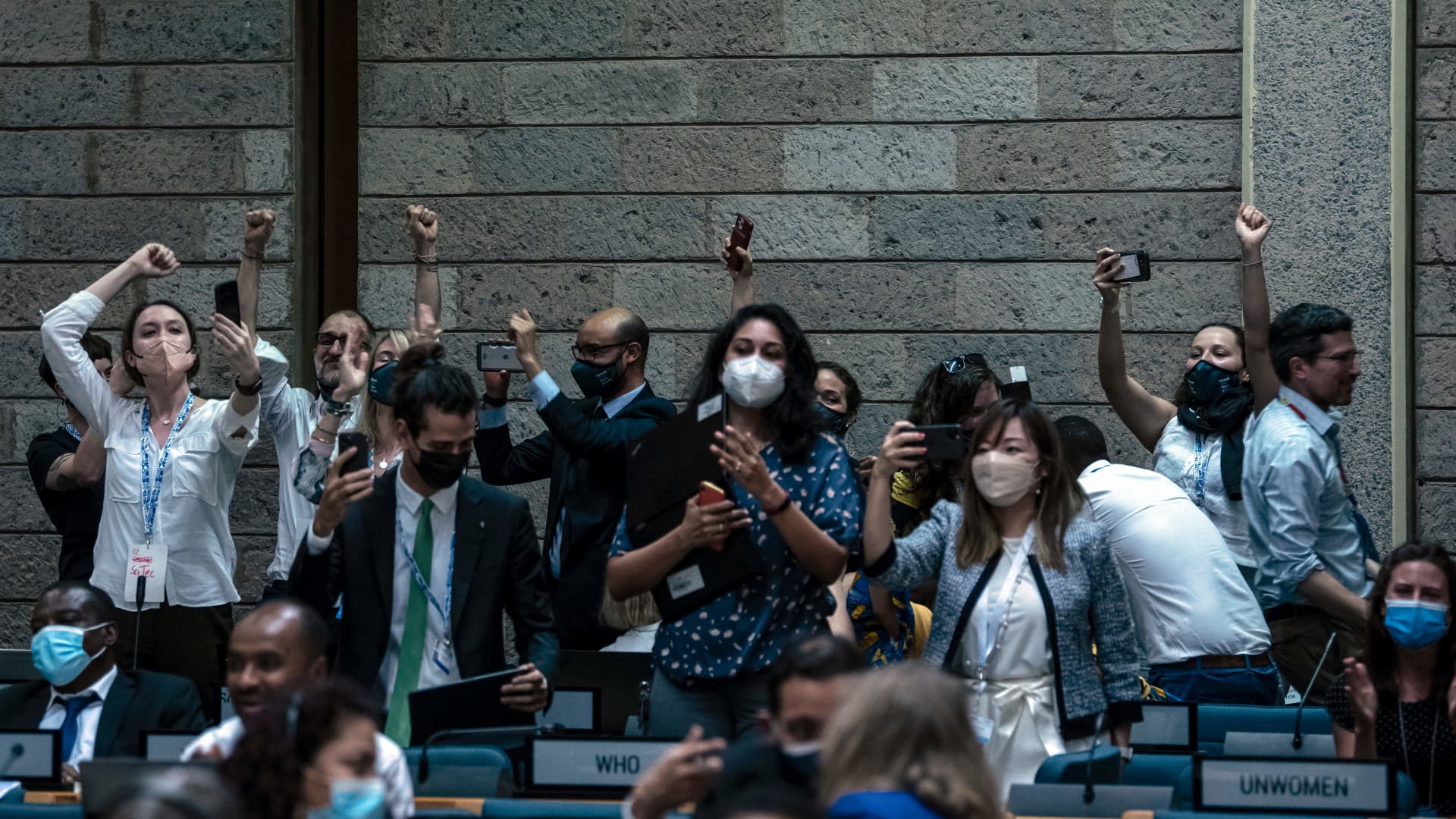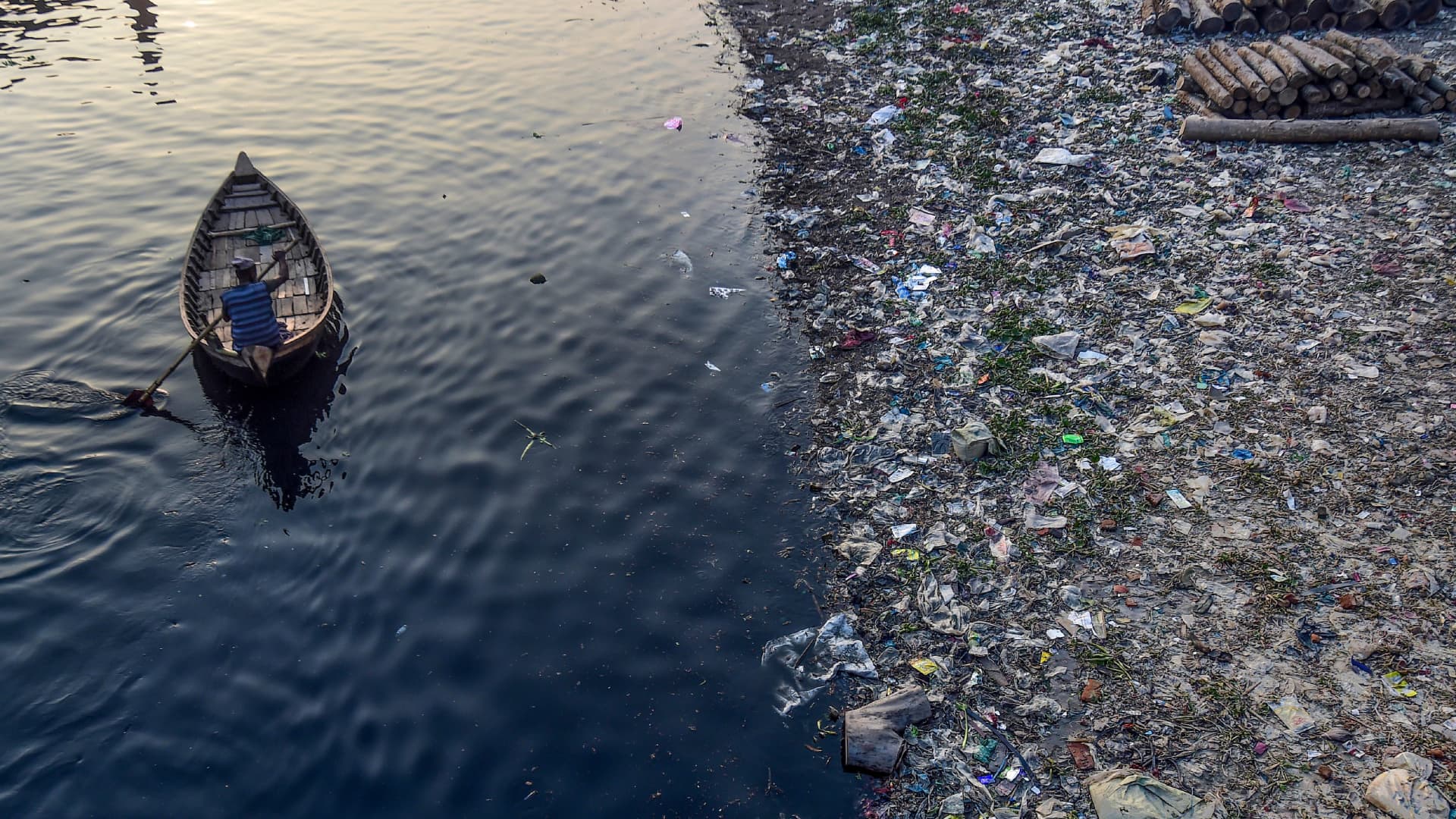
- World leaders, ministers and other representatives from nearly 200 countries at the United Nations environment assembly in Nairobi, Kenya, agreed on Wednesday to develop a treaty designed to bring an end to the scourge of plastic pollution.
- The resolution, which addresses the full lifecycle of plastic, including production, design and disposal, will be developed over the next two years.
- Inger Andersen, executive director of the U.N. Environment Programme, described the breakthrough as "a triumph by planet earth over single-use plastics."

The United Nations is poised to approve a plan to create the first-ever global plastic pollution treaty, hailing the resolution as the most important multilateral climate deal since the landmark 2015 Paris accord.
World leaders, ministers and other representatives from nearly 200 countries at the United Nations environment assembly in Nairobi, Kenya, agreed on Wednesday to develop a treaty designed to bring an end to the scourge of plastic pollution.
Get Tri-state area news delivered to your inbox.> Sign up for NBC New York's News Headlines newsletter.
The resolution, which addresses the full lifecycle of plastic, including production, design and disposal, will be developed over the next two years.
It is hoped an agreement to address the growing problem of plastic waste in the world's oceans, rivers and landscapes can be reached by the end of 2024.
Inger Andersen, executive director of the U.N. Environment Programme, described the breakthrough as "a triumph by planet earth over single-use plastics."
Money Report
"This is the most significant environmental multilateral deal since the Paris accord. It is an insurance policy for this generation and future ones, so they may live with plastic and not be doomed by it," Andersen said.
The U.N. agency warned that the success of any agreement would ultimately depend on the final terms of the deal, with delegates set to iron out the finer details by contending with the interests of member states.
"The historic nature of the mandate cannot be understated," David Azoulay, senior attorney at the Center for International Environmental Law, said in a statement.
"Six years ago, a legally-binding treaty that addresses the full life cycle of plastics seemed impossible and today's announcement is the result of multiple movements coming together to understand and address an emergency."
"Now, as we turn to negotiate a plastics treaty, we must continue to work together to ensure that the most robust protections for health, climate, biodiversity, and human rights are not watered down or undermined by Parties or industry," Azoulay said.
'A serious threat to our planet'
The resolution, entitled: "End Plastic Pollution: Towards an internationally legally binding instrument," was adopted at the conclusion of a three-day UNEA-5.2 meeting.
"We appreciate the support received from the various countries during this negotiation process," Modesto Montoya, Peru's environment minister said. The South American country's draft resolution, proposed with the government of Rwanda, contributed to the final resolution.
"Peru will promote a new agreement that prevents and reduces plastic pollution, promotes a circular economy and addresses the full life cycle of plastics," Montoya said.
The mandate for a legally binding treaty comes amid a sense of deepening public concern over plastic pollution.

The U.N. agency has warned plastic pollution ballooned to 348 million metric tons in 2017, up from 2 million metric tons in 1950. It says plastic pollution has become a global industry valued at more than $522 billion and is expected to double in capacity by 2040.
By the middle of the century, greenhouse gas emissions with plastic production, use and disposal are thought to be on track to account for 15% of allowed emissions under the terms of the Paris Agreement. The aspirational goal of the accord is to pursue efforts to limit global heating to a temperature increase of 1.5 degrees Celsius above pre-industrial levels.
"The world has come together [to] act against plastic pollution – a serious threat to our planet," Jeanne d'Arc Mujawamariya, Rwanda's environment minister, said. "International partnerships will be crucial in tackling a problem that affects all of us, and the progress made at UNEA reflects this spirit of collaboration."
Single-use plastics, such as bottles, bags and food packages, are the most commonly discarded type of plastic. Made almost exclusively from fossil fuels, these "throwaway" plastics often end their short lifecycle polluting the oceans, being burned or dumped into landfills.
Last year, a study found just 20 companies were the source of more than half of single-use plastic items thrown away globally.
The research, published by The Plastic Waste Makers Index last July, highlighted the devastating impact of discarded plastics on the environment and found that 20 petrochemical companies were responsible for 55% of the world's single-use plastic waste.
U.S. energy giant ExxonMobil topped the list, contributing 5.9 million metric tons to global plastic waste, closely followed by U.S. chemicals company Dow and China's Sinopec.






